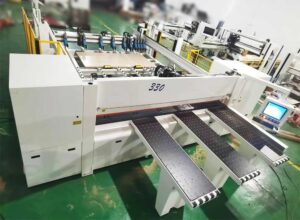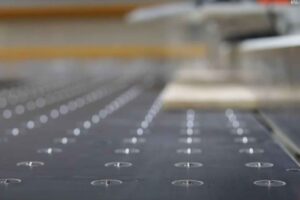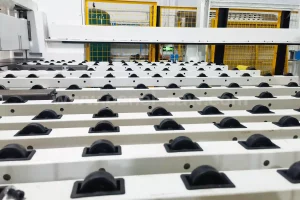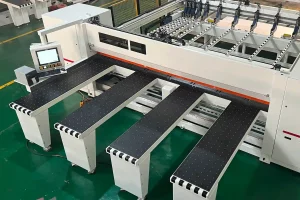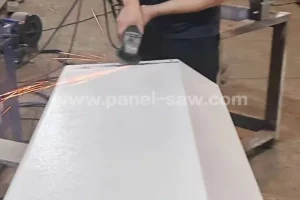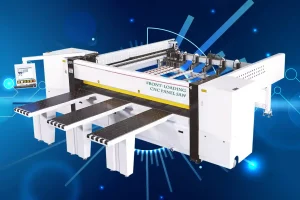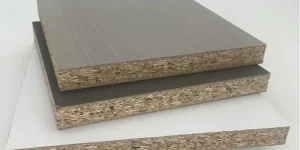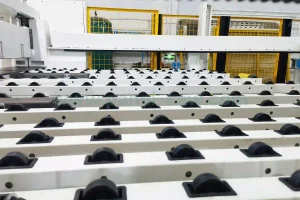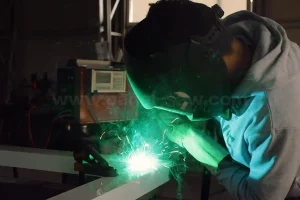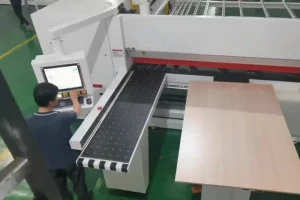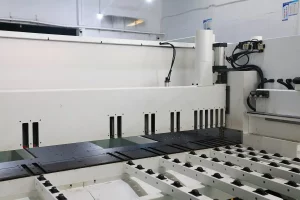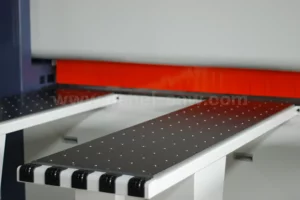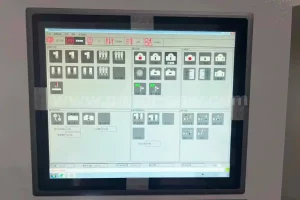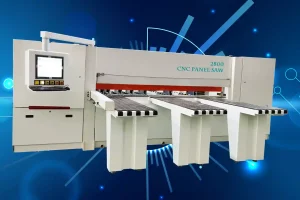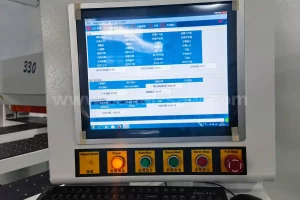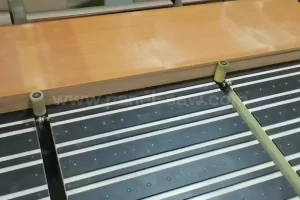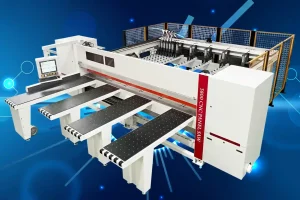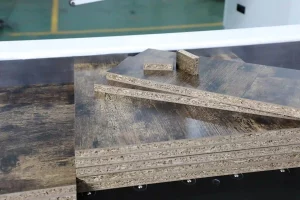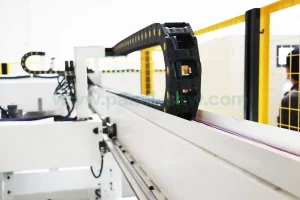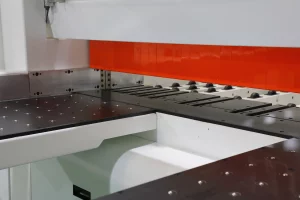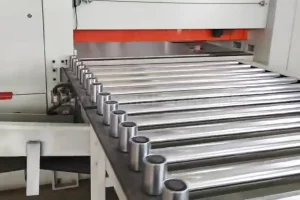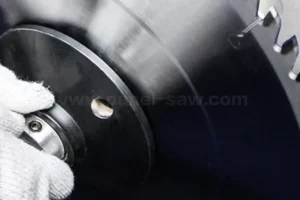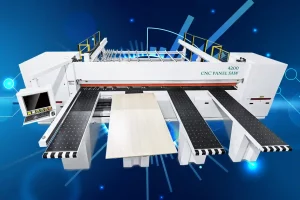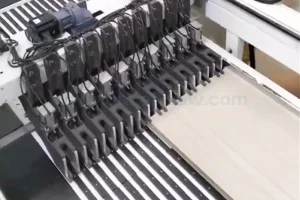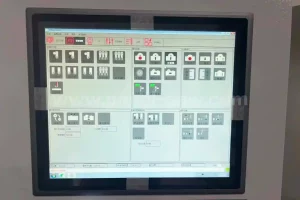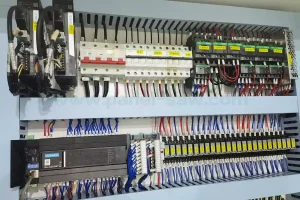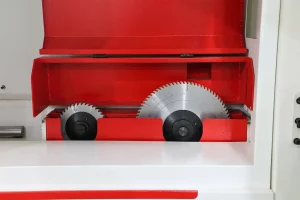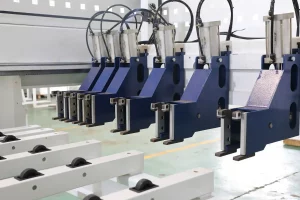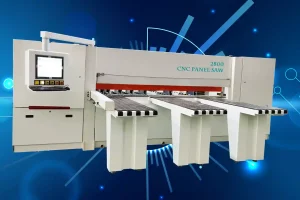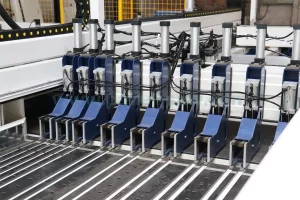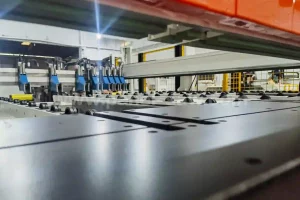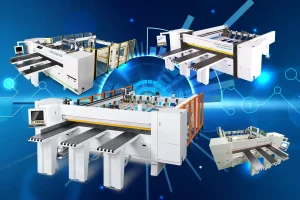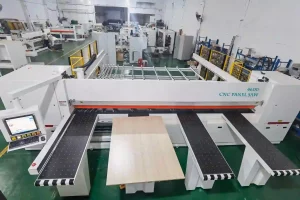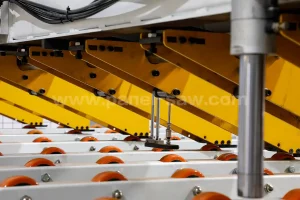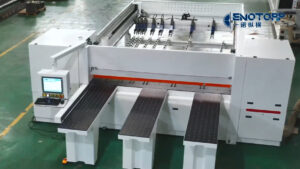
Precision Processing CNC Panel Saw: Optimizing Cut Accuracy and Efficiency
The precision processing CNC panel saw plays a pivotal role in modern manufacturing by offering unparalleled accuracy and efficiency in cutting materials. By harnessing computer numerical control (CNC) technology, these saws ensure consistent and repeatable cuts across a wide range of materials and thicknesses. The precision engineering and advanced control mechanisms of CNC panel saws optimize both accuracy and productivity in the manufacturing process.
Enhancing Precision with Advanced Technology
The core principle of precision processing CNC panel saws lies in their ability to precisely control the movement of both the saw blade and the workpiece. Sophisticated sensors and encoders track and monitor blade position and movement in real-time, ensuring precise alignment and consistent cut depths. The CNC control system can compensate for material variations and blade deflection, further enhancing accuracy.
Precision processing CNC panel saws are engineered with robust and stable constructions that minimize vibrations and ensure precise cuts. Utilizing high-quality materials and precision-engineered components guarantees durability and reliability. The saw’s rigid design and precise motion control ensure minimal deflection during operation, leading to consistently accurate cuts.
Improving Efficiency in Manufacturing, utilization of Precision Processing CNC Panel Saw
One of the significant advantages of precision processing CNC panel saws is their ability to enhance efficiency in manufacturing. By automating the cutting process, these saws eliminate the need for manual handling and adjustments. The precise cuts and reduced waste minimize material handling and transportation costs. Additionally, the increased accuracy and consistency of the cuts allow for easier assembly and fabrication of complex components.
The automation capabilities of precision processing CNC panel saws streamline the production workflow. Operators can program the saws to perform multiple cuts automatically, reducing downtime and optimizing throughput. This automation not only speeds up production but also reduces the risk of human error, ensuring that each piece meets exact specifications.
Versatility and Adaptability of Precision Processing CNC Panel Saw in Material Handling
Precision processing CNC panel saws offer increased flexibility in material handling, capable of accurately cutting a wide range of materials and thicknesses. This adaptability allows manufacturers to meet diverse production requirements without compromising on accuracy or efficiency. Whether in furniture making, automotive manufacturing, or aerospace engineering, these saws prove indispensable due to their versatility and precision.
The ability to handle different materials is a significant advantage of precision processing CNC panel saws. They can cut through materials such as plywood, MDF (Medium-Density Fiberboard), solid wood, plastics, composites, and even non-ferrous metals with ease. This versatility makes them suitable for various industries where different materials are used in manufacturing processes.
Ensuring Quality and Reliability
In addition to enhancing efficiency and versatility, precision processing CNC panel saws are instrumental in ensuring quality and reliability in manufacturing. The ability to make precise cuts consistently reduces scrap and rework, thereby improving overall product quality. Manufacturers can confidently deliver products that meet tight tolerances and customer expectations.
The reliability of precision processing CNC panel saws stems from their robust construction and advanced technology. These machines are designed to operate continuously in demanding production environments without compromising performance. Regular maintenance and adherence to operational guidelines further enhance their reliability, ensuring minimal downtime and consistent output.
Applications of Precision Processing CNC Panel Saw Across Industries
The applications of precision processing CNC panel saws span across various industries, each benefiting from their precision and efficiency in different ways:
Woodworking and Furniture Manufacturing: In woodworking, these saws excel in cutting large panels and intricate shapes with precision. Furniture manufacturers use them to produce components such as cabinet doors, tabletops, and decorative panels.
Construction and Building Materials: Precision processing CNC panel saws are used in construction for cutting materials like plywood, gypsum boards, and insulation panels. They contribute to the efficiency and accuracy required in building and renovation projects.
Automotive and Aerospace: In the automotive and aerospace industries, where precision is critical, these saws are used to cut materials for vehicle interiors, aircraft components, and structural parts. They help maintain strict tolerances and meet rigorous safety standards.
Signage and Display Manufacturing: For producing signage, display panels, and exhibition stands, precision processing CNC panel saws ensure accurate cuts in materials such as acrylics, PVC, and aluminum composite panels.
Sustainability and Cost Savings
Another significant benefit of precision processing CNC panel saws is their contribution to sustainability and cost savings. By optimizing material usage and minimizing waste, these saws help manufacturers reduce raw material consumption and disposal costs. The precise cuts also minimize the need for additional finishing processes, saving both time and resources.
Manufacturers can achieve cost savings through reduced labor costs and improved productivity. The automation and efficiency of precision processing CNC panel saws allow for faster production cycles and shorter lead times. This operational efficiency translates into higher output and competitiveness in the market.
Innovations and Future Trends for Precision Processing CNC Panel Saw
Looking ahead, the evolution of precision processing CNC panel saws continues with advancements in technology and innovation. Manufacturers are integrating artificial intelligence (AI) and machine learning algorithms to further enhance automation and predictive maintenance capabilities. These technologies will enable saws to adapt to changing production demands and optimize performance even further.
Additionally, the integration of IoT (Internet of Things) connectivity allows for real-time monitoring and remote diagnostics of CNC panel saws. This connectivity enables manufacturers to track performance metrics, identify potential issues proactively, and optimize operational efficiency across multiple production lines.
Conclusion
In conclusion, precision processing CNC panel saws are indispensable tools in modern manufacturing, offering unmatched accuracy, efficiency, and versatility. By leveraging CNC technology, these saws optimize cut accuracy, enhance productivity, and ensure consistent quality across diverse applications and industries. As manufacturing processes evolve, precision processing CNC panel saws will continue to play a crucial role in driving innovation, sustainability, and cost-effectiveness.
This comprehensive article has explored the capabilities, benefits, applications, and future trends of precision processing CNC panel saws in modern manufacturing. From their advanced technology and efficiency enhancements to their versatility across industries, these saws represent a significant advancement in cutting technology. By optimizing cut accuracy and efficiency, precision processing CNC panel saws empower manufacturers to achieve higher productivity, reduce waste, and improve overall product quality.
FAQ
1. What is a precision processing CNC panel saw?
A precision processing CNC panel saw is a cutting tool equipped with computer numerical control (CNC) technology, capable of delivering accurate and repeatable cuts across various materials and thicknesses.
2. How does a precision processing CNC panel saw improve cut accuracy?
Precision processing CNC panel saws use advanced sensors and encoders to monitor blade position and movement in real-time, ensuring precise alignment and consistent cut depths. This technology minimizes errors and enhances overall cut accuracy.
3. What are the primary benefits of using precision processing CNC panel saws in manufacturing?
The primary benefits include enhanced efficiency through automation, reduced material waste, improved productivity, and the ability to handle a wide range of materials with precision and consistency.
4. In which industries are precision processing CNC panel saws commonly used?
Precision processing CNC panel saws are used in industries such as furniture making, automotive manufacturing, aerospace engineering, construction, and woodworking, where accurate and efficient cutting is crucial.
5. How do precision processing CNC panel saws contribute to cost savings?
By automating the cutting process and minimizing material waste, precision processing CNC panel saws reduce operational costs associated with labor, material handling, and rework, thereby contributing to overall cost savings.
6. What factors should be considered when choosing a precision processing CNC panel saw?
Important factors include cutting capacity (size and thickness of materials), automation features, software compatibility, reliability, after-sales support, and the specific requirements of the manufacturing processes.
7. Are precision processing CNC panel saws suitable for small-scale manufacturing operations?
Yes, precision processing CNC panel saws are suitable for both small-scale workshops and large-scale manufacturing facilities. They offer scalability, flexibility, and efficiency, making them adaptable to various production volumes and requirements.
8. How can precision processing CNC panel saws improve product quality?
Precision processing CNC panel saws improve product quality by ensuring precise and consistent cuts, reducing errors and defects in finished products. This results in higher-quality components and improved customer satisfaction.
9. What are some safety considerations when operating precision processing CNC panel saws?
Safety considerations include proper training for operators, implementing safety protocols and procedures, using personal protective equipment (PPE), and ensuring that the saw is properly maintained and operated according to manufacturer guidelines.
10. How does the stability of precision processing CNC panel saws affect their performance?
The stability of precision processing CNC panel saws, achieved through robust construction and precise motion control, minimizes vibrations and ensures accurate cuts. This stability is crucial for maintaining cut quality and achieving desired results consistently.

